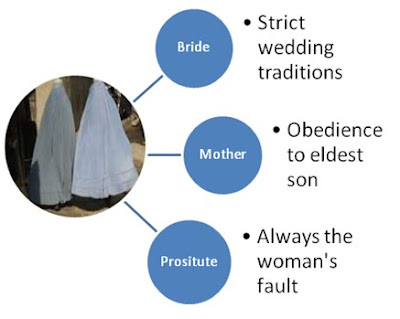The Bookseller of Kabul - Journal Entry #2
While reading the Chapter, Do You Want To Make Me Sad, it was surprising how a physical ailment, like a limp in your leg, makes you so worthless to a man. Bulbula is kept with her mother until she is a lot older than most girls are before they are sold to a husband but in this case, she couldn't necessarily have a man pay for her. Perhaps even more surprising were the restrictions we read in the next Chapter, No Admission To Heaven. There were 16 decrees, all that we felt were absurd. They have such strict rules, especially women, and some that don't even make sense, such as kite flying. Not only are the restrictions over the top, but their punishments are brutal. For example: "Prohibition against shaving - Anyone who has shaved off or cut his beard will be imprisoned until the beard has grown to the length of a clenched fist" (Page 80). This is just one example of the harsh rules they are forced to follow and the excessive consequences that follow. The following Chapter also surprised us with some of the details. We were surprised that women are left without any power and, when in the market, they seem even less of an individual. While they walk around, they are referred to as burka instead of by name. This technique used by the Author shows that women don't really have an identity, the Author is expressing how she feels about this situation without using her own words to say it.
The following day's reading, Chapteres 9 - 11, also had some surprising detail. In the Chapter, The Matriarch, the Author describes Bibi Gul's children and what happened to them in the past. The son Farid, for example, was excommunicated by Sultan for disrespecting him. Bibi Gul was also forced to give up her last born son due to a promise she made to a baren mother(a childless mother). The biggest surprise through these Chapters in the overall image of these women. They live these long, often unhappy lives filled with little choice, and the little choice they have they often have to give up. They live with great responsibility and loss, things that most people would not have to endure in our world. For them, this kind of agony is not uncommon, if anything, it's just considered typical. Not only was the Chapter, Temptations, surprising but we all found it disgusting and immoral. We thought so because of how Mansur took advantage of the young girl who was only 12 and slept with her as if she was a prostitute(giving her money after sex).
A passage that we thought was extremely well written is the burka scene that we discussed in our first paragraph:
“She keeps losing sight of the billowing burka, which merges with every other billowing burka. Sky blue everywhere. Her eyes are drawn to the ground. In the mud she can distinguish the dirty shoes from other dirty shoes. She can see the trimming on the white trousers and catch a glimpse of the edge of the purple dress worn over them. She walks around the bazaar, looking down, following the fluttering burka…”
We thought this was a well written paragraph because not only did it introduce the Chapter well but the writing helped give a vivid picture for the reader.



